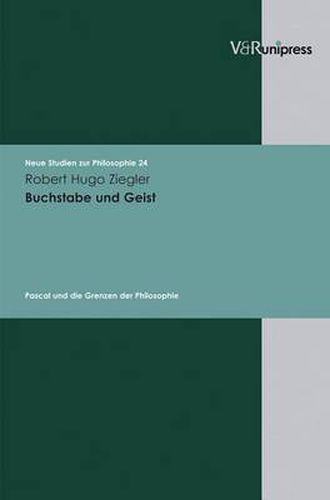Readings Newsletter
Become a Readings Member to make your shopping experience even easier.
Sign in or sign up for free!
You’re not far away from qualifying for FREE standard shipping within Australia
You’ve qualified for FREE standard shipping within Australia
The cart is loading…






English summary: In this book, Pascal’s philosophy, often dismissed as mere moralistic literature, is subjected to a systematic interpretation. His thoughts on human existence lead to the destruction of the very concept of human nature; anthropology becomes antianthropology. Furthermore, it is shown how the theory as well as the use of language in Pascal is profoundly animated by a critical account of language that follows the idea that every expression depends on something that has not yet been expressed or that cannot be properly expressed. Language, therefore, cannot claim to freely dispose of reality but must submit itself to the charge of expressing a truth not yet articulated. On this basis, the questions of truth and the essence of philosophy itself are approached with the instruments developed in the course of the interpretation, especially with the concept that is shown to be crucial to Pascal’s thought: the concept of a dialectic of interior and exterior, of a conflict between letter and spirit. It is the spirit that establishes the rights of the letter; but, despite its contingency and irreducible materiality, it is the letter that lends effective reality (Wirk-lichkeit) to the spirit. Thus, thoughts or intentions are nothing but vacuous virtualities, if they are not realized in words or actions; but this realization affects in return the thought or the intention that motivated the whole process, thus creating a dialectical and dynamic relationship. German description: Dieser Band behandelt das haufig unterschatzte Werk Pascals. Dessen Denken uber den Menschen erweist sich in einer zusammenfassenden Interpretation als eine regelrechte Antianthropologie: Die Analyse von Mechanismen wie der Imagination, der Gewohnheit und der Begierde verweist auf die radikale Kontingenz der menschlichen Existenz. Theorie und Praxis der Sprache bei Pascal zeugen von einem sprachkritischen Bewusstsein, das sich in einer doppelten Mahnung ausdruckt: Wir verfugen nicht mit unseren Worten uber die Wirklichkeit; daher mussen diese sich in den Dienst von etwas noch nicht Ausgedrucktem, vielleicht auch eines Unausdruckbaren stellen. Davon ausgehend lassen sich mit Pascal und uber ihn hinausgehend die Fragen nach der Wahrheit und der spezifischen Aufgabe und Charakterisierung der Philosophie neu beantworten. Was diese Analysen zusammenhalt, ist eine Denkfigur, die sich bei Pascal in allen Bereichen findet. Sie lasst sich als Dialektik von Innen und Aussen, von Geist und Buchstabe bezeichnen: Es ist der Geist, der das Recht des Buchstabens begrundet. Der Buchstabe aber lasst durch seine unaufhebbare Faktizitat und Materialitat dem Geist erst Wirklichkeit im strengen Sinn zukommen.
$9.00 standard shipping within Australia
FREE standard shipping within Australia for orders over $100.00
Express & International shipping calculated at checkout
English summary: In this book, Pascal’s philosophy, often dismissed as mere moralistic literature, is subjected to a systematic interpretation. His thoughts on human existence lead to the destruction of the very concept of human nature; anthropology becomes antianthropology. Furthermore, it is shown how the theory as well as the use of language in Pascal is profoundly animated by a critical account of language that follows the idea that every expression depends on something that has not yet been expressed or that cannot be properly expressed. Language, therefore, cannot claim to freely dispose of reality but must submit itself to the charge of expressing a truth not yet articulated. On this basis, the questions of truth and the essence of philosophy itself are approached with the instruments developed in the course of the interpretation, especially with the concept that is shown to be crucial to Pascal’s thought: the concept of a dialectic of interior and exterior, of a conflict between letter and spirit. It is the spirit that establishes the rights of the letter; but, despite its contingency and irreducible materiality, it is the letter that lends effective reality (Wirk-lichkeit) to the spirit. Thus, thoughts or intentions are nothing but vacuous virtualities, if they are not realized in words or actions; but this realization affects in return the thought or the intention that motivated the whole process, thus creating a dialectical and dynamic relationship. German description: Dieser Band behandelt das haufig unterschatzte Werk Pascals. Dessen Denken uber den Menschen erweist sich in einer zusammenfassenden Interpretation als eine regelrechte Antianthropologie: Die Analyse von Mechanismen wie der Imagination, der Gewohnheit und der Begierde verweist auf die radikale Kontingenz der menschlichen Existenz. Theorie und Praxis der Sprache bei Pascal zeugen von einem sprachkritischen Bewusstsein, das sich in einer doppelten Mahnung ausdruckt: Wir verfugen nicht mit unseren Worten uber die Wirklichkeit; daher mussen diese sich in den Dienst von etwas noch nicht Ausgedrucktem, vielleicht auch eines Unausdruckbaren stellen. Davon ausgehend lassen sich mit Pascal und uber ihn hinausgehend die Fragen nach der Wahrheit und der spezifischen Aufgabe und Charakterisierung der Philosophie neu beantworten. Was diese Analysen zusammenhalt, ist eine Denkfigur, die sich bei Pascal in allen Bereichen findet. Sie lasst sich als Dialektik von Innen und Aussen, von Geist und Buchstabe bezeichnen: Es ist der Geist, der das Recht des Buchstabens begrundet. Der Buchstabe aber lasst durch seine unaufhebbare Faktizitat und Materialitat dem Geist erst Wirklichkeit im strengen Sinn zukommen.